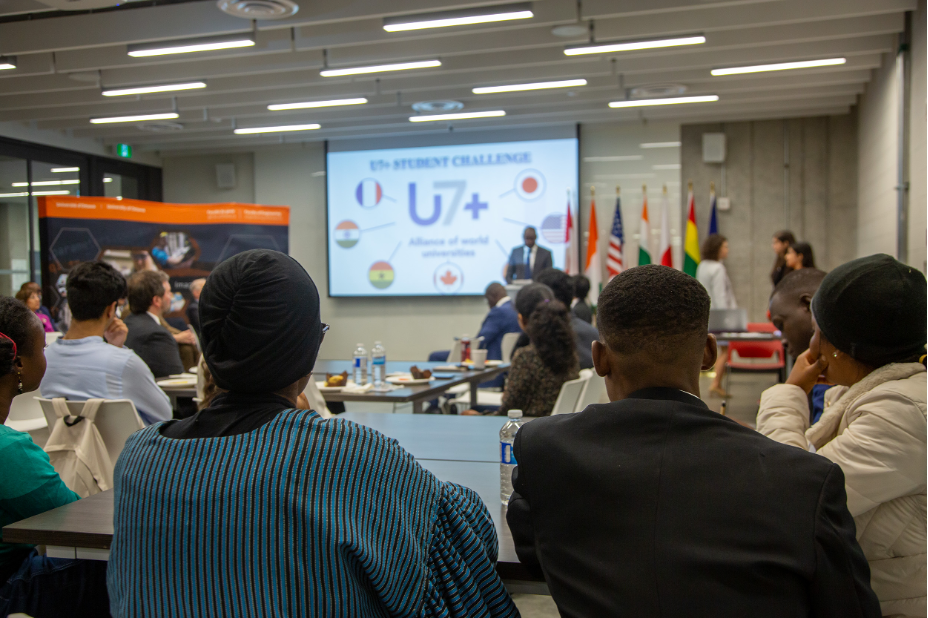U7+ Student Challenge Team Tackles Sustainable Electric Vehicle Battery Production

Northwestern University students addressed the human rights and environmental issues posed by the electric vehicle (EV) battery industry at the second annual U7+ Student Challenge, this year hosted by the University of Ottawa in Canada.
A Northwestern University student team addressed challenges associated with the electric vehicle (EV) battery industry through the second annual U7+ Student Challenge, a competition among students from U7+ Alliance of World Universities member institutions. This year, U7+ Student Challenge finalists presented their projects at an event hosted by the University of Ottawa and Northwestern's team took second place in their category.
The U7+ Alliance is the first coalition of university presidents aimed at defining concrete actions universities can take to collectively address global challenges in coordination with government leaders in G7 countries and beyond. In 2021, Northwestern was elected to serve as the U7+ Alliance's first Secretariat, which is housed at the Northwestern Roberta Buffett Institute for Global Affairs. Among the initiatives launched during Northwestern's tenure as Secretariat is the U7+ Student Challenge, which created space for students attending U7+ Alliance member institutions to collaborate, research and propose solutions to a local challenge linked to the United Nations Sustainable Development Goals (UN SDGs).
This year's U7+ Student Challenge theme encouraged students to address critical obstacles to sustainable mobility by leveraging technology and multidisciplinary solutions.
Northwestern's team focused on revolutionizing the EV battery supply chain for a more sustainable future. Its members, who have different backgrounds in engineering, economics and industrial management, included McCormick School of Engineering students, Vilin Hegde (Master of Engineering Management '23), Sitara Muraleedharan (Master of Engineering Management '23), Minal Ramteke (Master of Engineering Management '23) and Neel Rakesh Shah (Master of Engineering Management '23).
Together, they chose to confront crucial issues in EV battery production, spotlighting the hidden toll of the industry in the Democratic Republic of the Congo and worldwide. EV battery production now composes 34 percent of cobalt mining, and the industry is a leading contributor to unsafe working conditions, child labor practices and other human rights abuses in the country.
"This is an example where clean technology bears an unsustainable supply chain. Whereas we are moving towards a greener alternative with EV, it's causing human rights abuse in Congo and environmental degradation in countries like Chile," Muraleedharan and Hegde said.
While EVs have zero tailpipe emissions compared to gasoline-powered vehicles, their manufacturing process still creates a sizable carbon footprint that the industry must reduce to make a lasting impact. "What is primarily concerning is that these unsustainable practices are being underreported and overlooked, which is alarming and counterintuitive. We cannot solve a problem if we don't look directly at it," they added.
Their vision was to create transparency in the battery value chain and track progress toward developing more environmentally sustainable batteries. Through digitization and traceability technologies, the team's proposed solution was a platform that could create a global reporting framework and offer a quality seal for EV battery manufacturing.
"We've had the opportunity to learn from an incredibly versatile and culturally diverse community. Understanding the importance of sustainability across industries is becoming increasingly crucial, and this platform has granted us exposure to valuable knowledge from different regions," Hegde and Shah said.
Coming back from the challenge, the team reflected as a group on how collaboration within the U7+ Alliance shaped their proposal.
How did your team decide to take on the problem of sustainable mobility at the U7+ Student Challenge?
"In the larger scale of technological development, every innovation goes through a cycle of unsustainability. It is a resource bottleneck. This is especially true with hard-tech innovations. The current electric vehicle tech is comparably new in mass-scale production, so these challenges are certainly predictable. We proposed bringing more regulatory standards into the EV supply chain, focusing on ethical sourcing and solving labor issues in developing countries. The technology digitizes these aspects with blockchain and AI, where we translate our goals into real numbers. Of course, it can only work if there is a solid understanding and acceptance across the industries and governments, which is an aspect that we frequently discussed during the U7 + challenge," Muraleedharan and Hegde said.
How did collaboration shape your team’s proposal?
"The U7+ Student Challenge is an exceptional platform where students, mentors and professors converge to present innovative ideas to improve the environment. The knowledge gained and connections from this experience will undoubtedly shape our future endeavors. To all the aspiring students out there thinking about participating in a future U7+ Student Challenge, we encourage you to seize this opportunity. It will not only foster personal growth and development but also allow you to become an agent of positive change on a global scale," Ramteke and Shah said.
What are the next steps for your team and your project?
"Ideally, we would seek a partnership with a battery manufacturing company that aligns with our solution's supply chain aspects. Collaborating with regulatory bodies, UN representatives and other people will be essential to bring standards across the world. This is important to keep the market equilibrium for competition as, without regulations, some companies will find it costly to implement our solution because not all businesses will voluntarily invest in this technology. Overall, it will provide us with a valuable opportunity to test our concepts in a real-world setting and we will gain insights into the challenges of implementing our solution," Ramteke and Shah said.
Learn more about the second annual U7+ Student Challenge >>
